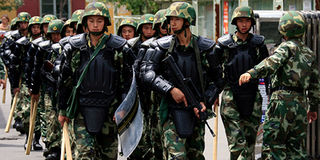Premium
UK reignites human rights charge against China

Armed Chinese paramilitary policemen in riot gear march out of their barracks before the start of Friday Muslim prayers near the Dong Kuruk Bridge mosque in the city of Urumqi in China's Xinjiang Autonomous Region on July 17, 2009.
The United Kingdom on Tuesday led 46 other countries in signing on a joint statement that called for an end to ‘torture’ in China’s Xinjiang province, potentially reigniting a saga Beijing has been fighting.
The statement to the UN Human Rights Council included two African countries; eSwatini and Liberia among other mostly European countries, and asked China to address human rights concerns “including to end the arbitrary detention of Muslim Uyghurs and persons belonging to other minorities.”
“Numerous extensively researched and credible reports indicate that over a million people have been arbitrarily detained,” the countries indicated in a joint statement.
“We are also concerned about reports of torture and other cruel, inhuman or degrading treatment or punishment, forced sterilisation, sexual and gender-based violence, forced labour, and forced separation of children from their parents by authorities.”
The comments follow Beijing’s policy of counterterrorism in Xinjiang, a region northwest of the country that is mostly populated by Uighurs, a Muslim ethnic group, and several minority groups. Ever since China launched the programme it argues is meant to address extremism, Beijing has been accused of imposing excesses. On Tuesday, the 47 countries claimed credible reports have shown them there still exists “widespread surveillance, discrimination against Uyghurs and other persons belonging to minorities as well as of severe restrictions on Uyghur culture and the exercise of human rights and fundamental freedoms, including the right to freedom of religion or belief.”
“We repeat our call on China to urgently address these concerns and implement the CERD’s (Committee on Elimination of Racial Discrimination) eight recommendations relating to Xinjiang from August 2018, as well as the concerns raised by numerous Special Procedures since that time, “they said referring to a UN panel of experts charged with investigating discrimination.
The comments came ahead of the expected report on last month’s visit by Michelle Bachelet, the UN Human Rights Commissioner who, nonetheless faced criticism for not demanding adequate assurances from china.
Last week, Zhao Lijian, China’s Foreign Ministry Spokesman lampooned the critics of his country’s policy in Xinjiang, saying the story of torture and genocide were “a lie of the century, made up by the US.
“We once again ask the US to give an explanation, and stop its despicable moves of smearing Xinjiang with political manipulation,” he argued.
China’s policy in Xinjiang, however, has seen critics call for a boycott of Xinjiang products for being associated with forced labour. The region is one of the world’s biggest source of solar panel-making material.
Adrian Zenz, a Senior Fellow and Director in China Studies, even suggested in a blog on The Jamestown Foundation said goods produced in China must be subjected to vetting to ensure no forced labour has been used, while placing care to exempt products made from voluntary extensive labour such as cotton, textile and garment production and polysilicon, the material for solar panels.
“However, Xinjiang's pursuit of "high-quality development" and intensified vocational training means that sectors requiring higher skills levels will in the future increasingly be at risk of coercive labour as well,” he argued.
Forced labour, he urged, may expand from predominantly low-skilled into increasingly more high-skilled industrial sectors as more educated people are forced into camps, eventually leading to forced migration of people to urban centres due to the labour needed.
On Tuesday, these countries also endorsed the statement: Albania, Andorra, Australia, Austria, Belgium, Belize, Bulgaria, Canada, Croatia Czech Republic, Denmark, Estonia, Finland, France, Germany, Guatemala, Honduras and Iceland. Others included: Ireland, Israel, Italy, Japan, Latvia, Liechtenstein, Lithuania, Luxembourg, Marshall Islands, Monaco, Montenegro, Netherlands, New Zealand, North Macedonia, Norway, Palau, Poland, Portugal, Romania, San Marino, Slovakia, Slovenia, Spain, Sweden, Switzerland, United Kingdom and the United States.





